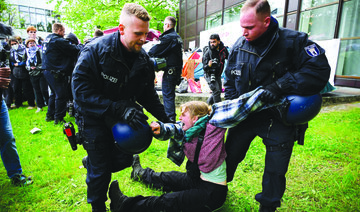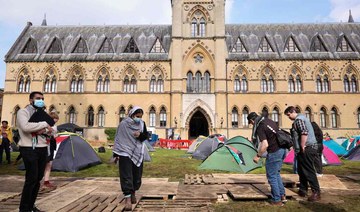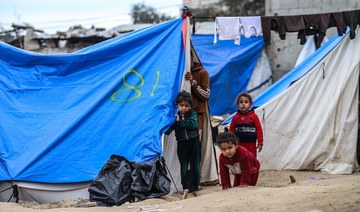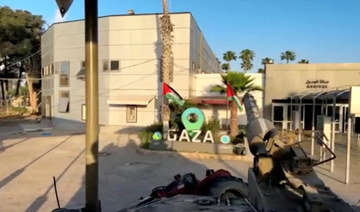KABUL: The Taliban’s religious police have put up posters around the capital Kabul ordering Afghan women to cover up, an official said Friday, the latest in a string of creeping restrictions.
The poster, which includes an image of the face-covering burqa, was slapped on cafes and shops this week by the Ministry for the Promotion of Virtue and Prevention of Vice.
Since returning to power in August, the Taliban have increasingly curtailed freedoms, particularly those of women and girls.
“According to Shariah law, Muslim women must wear the hijab,” the poster reads, referring to the practice of covering up.
A spokesman for the ministry, responsible for enforcing the Taliban’s harsh interpretation of Islamic law, confirmed to AFP on Friday that it was behind the orders.
“If someone does not follow it, it does not mean she will be punished or beaten, it’s just encouragement for Muslim women to follow Shariah law,” Sadeq Akif MuHajjir said.
In Kabul, women already cover their hair with headscarves, though some wear modest western clothing.
Outside of the capital the burqa, which became mandatory for women under the Taliban’s first regime in the 1990s, has remained common.
“What they’re trying to do is to spread fear among the people,” a university student and women’s rights advocate, who did not want to be identified, told AFP. “The first time I saw the posters I was really petrified, I thought maybe (the Taliban) will start beating me. They want me to wear a burqa and look like nothing, I would never do that.”
The burqa became mandatory for women under the Taliban’s first regime in the 1990s
The Taliban, which is desperate for international recognition to allow funding flows to reopen to the war-wracked country, have so far refrained from issuing national policies.
Instead, they have published guidance for men and women that has varied from province to province.
“This is not good. 100 percent, this will create fear,” said Shahagha Noori, the supervisor of a Kabul restaurant where the poster had been put up by the Taliban. “I think if the Taliban get international recognition, then they will start to enforce it.”
Although the Taliban have promised a lighter version of the hard-line rule that characterised their first stint in power from 1996 to 2001, women are largely excluded from government employment, and secondary schools for girls have remained shuttered in several provinces.
They have also been banned from traveling alone on long journeys.
No nation has yet formally recognized the Taliban government and diplomats face the delicate task of channelling aid to the stricken Afghan economy without propping up the hard-line group.
Taliban religious police issue posters ordering women to cover up according to ‘Shariah law’
https://arab.news/j9x4x
Taliban religious police issue posters ordering women to cover up according to ‘Shariah law’
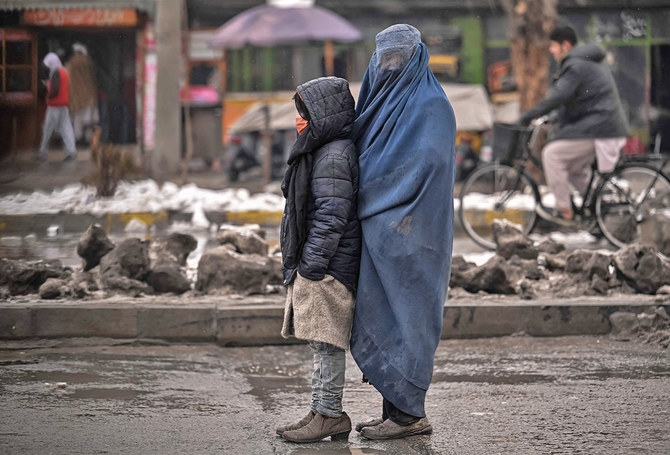
- Poster, which includes image of face-covering burqa, was slapped on cafes and shops this week
- Spokesperson for Ministry for Promotion of Virtue and Prevention of Vice confirms it was behind the orders
Europe student Gaza protests spread, sparking clashes, arrests
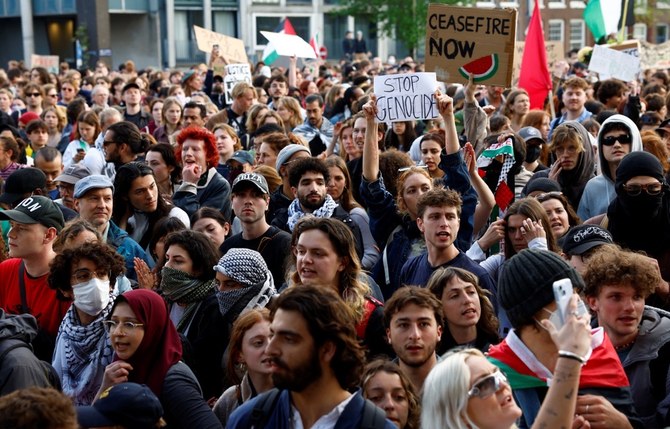
AMSTERDAM: Student protests to demand that universities sever ties with Israel over the Gaza war spread in Europe on Tuesday, sparking clashes and arrests as fresh protests broke out in the Netherlands, Germany, France, Switzerland and Austria.
Students at various European universities, inspired by ongoing demonstrations at US campuses, have been occupying halls and facilities, demanding an end to partnerships with Israeli institutions because of Israel’s punishing assault on Gaza.
Several hundred protesters resumed a demonstration on Tuesday evening around the University of Amsterdam campus, where police the previous night were filmed baton-charging them and smashing up their tents after they refused to leave the campus.
As protests resumed on Tuesday night, demonstrators erected barriers to access routes watched over by a heavy police deployment.
Police said in a statement that a total of 169 people had been arrested when officers broke up Monday night’s protests.
All had been released apart from two who remain in custody on suspicion of public disorder offenses.
Violence had briefly erupted on Monday evening when a small group of counter-protesters wielding flares stormed the main protest.
Around 50 demonstrators were also protesting on Tuesday outside the library in Utrecht University and a few dozen at the Technical University of Delft, according to local news agency ANP.
In the eastern German city of Leipzig, the university said in a statement that 50 to 60 people occupied a lecture hall on Tuesday afternoon, waving banners that read: “University occupation against genocide.”
Protesters barricaded the lecture hall doors from the inside and erected tents in the courtyard, according to the university.
The university called in the police in the afternoon, and filed a criminal complaint.
A pro-Israeli counter-protest also took place in the area, involving about 40 people, police said.
Criminal proceedings have been initiated against 13 people who were in the lecture hall on suspicion of trespassing. No arrests have been made so far.
Earlier, at Berlin’s Free University, police cleared a demonstration after up to 80 people erected a protest camp in a courtyard of the campus.
The protesters, some of whom wore the keffiyeh scarf that has long been a symbol of the Palestinian cause, sat in front of tents and waved banners.
They later tried to enter rooms and lecture halls and occupy them, according to the university, which said it then called in the police to clear the protest.
The university said property was damaged while classes in some buildings were suspended for the day.
Berlin police said they made some arrests for incitement to hatred and trespassing.
In Paris, police on Tuesday twice intervened at Paris’s prestigious Sciences Po university to disperse about 20 students who had barricaded themselves in the university’s main hall.
Police moved in to allow other students to take their exams and made two arrests, according to Paris prosecutors. The university said the exams were able to proceed without incident.
Police have intervened several times over the past week at Sciences Po, where protesters are demanding the university reveal its partnerships with Israeli institutions. Some 13 students are on a hunger strike, according to the university.
At the nearby Sorbonne university building, police moved on Tuesday evening to eject about a hundred students who had occupied an amphitheater for two hours to protest about Gaza, police sources said.
In Switzerland, protests on Tuesday spread to three universities in Lausanne Geneva and Zurich.
The University of Lausanne said in a statement that it “considers that there is no reason to cease these relations” with Israeli universities as protesters demand.
In Austria, dozens of protesters have been camped on the campus of Vienna University, putting up tents and stringing up banners since late on Thursday.
The war in the Gaza Strip was sparked by an unprecedented October 7 attack on Israel by the Palestinian group Hamas, which resulted in the deaths of more than 1,170 people, mostly civilians, according to an AFP tally of Israeli official figures.
Vowing to destroy Hamas, Israel launched a retaliatory offensive that has killed at least 34,789 people in Gaza, mostly women and children, according to the Hamas-run territory’s health ministry.
Israeli Rafah offensive would break international law, says UK deputy foreign minister

- Andrew Mitchell warns a ground invasion could strengthen Hamas, in comments viewed as attempt to get Israel to sign up for peace deal accepted by Hamas on Monday
- UN chief Antonio Guterres urges Israel to ‘stop any escalation’ after tanks enter Rafah and army takes control of crossing on the border with Egypt
LONDON: An Israeli ground offensive in Rafah would contravene international humanitarian law and would not succeed in removing Hamas from power in Gaza or eradicating the organization, Britain’s deputy foreign minister warned on Tuesday.
Andrew Mitchell said Israeli authorities had failed to present a military plan that complies with international law, and that entering Rafah, which has become the final refuge for more than a million people displaced by fighting in other parts of Gaza, could strengthen, not weaken, Hamas.
However, he stopped short of saying what international consequences, if any, Israel might face if it proceeds.
Mitchell reiterated the UK government’s desire for a permanent, sustained ceasefire in Gaza. His comments, which followed a similar statement by authorities in France on Monday, were seen as an attempt to put pressure on Israel to sign up for a provisional, three-stage peace deal that was accepted by Hamas on Monday, The Guardian newspaper reported on Tuesday.
Israeli minister Benny Gantz has said the peace proposal did not “correspond to the dialogue that has taken place so far with the mediators and has significant gaps.”
Mitchell also echoed calls from the UN for Israel to end a renewed block on humanitarian aid entering Gaza. Also on Tuesday, UN Secretary-General Antonio Guterres called for border crossings to be reopened “immediately” so that essential aid can be delivered to Gaza. He urged Israeli authorities to “stop any escalation” after they sent tanks into Rafah early on Tuesday and the army took control of the nearby crossing on the border with Egypt.
“Things are moving in the wrong direction. I am disturbed and distressed by the renewed military activity in Rafah by the Israel Defense Forces,” Guterres said.
International pressure has been building on Israel over the potentially devastating consequences of a threatened ground invasion of Rafah, where the UN estimates about 1.4 million Palestinians are sheltering.
EU foreign policy chief Josep Borrell said such action could cause many “civilian casualties.” White House spokesperson John Kirby said that Israel told Washington its operation in Rafah “was limited and designed to cut off Hamas’s ability to smuggle weapons” into Gaza.
Egypt has urged Israeli authorities to “exercise the utmost restraint.” The Organization for Islamic Cooperation condemned Israel’s “criminal aggression.”
Berlin students protest for Gaza as demos spread across Europe
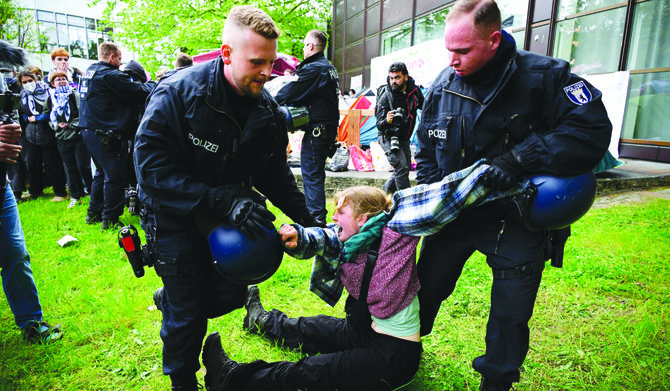
- Scuffles erupt between officers, protesters
- Crackdown on University of Amsterdam protest
- Israel has killed more than 34,700 Palestinians, most of them women and children, according to the Hamas government's Ministry of Health
AMSTERDAM: German police on Tuesday broke up a protest by several hundred pro-Palestinian activists who had occupied a courtyard at Berlin’s Free University earlier in the day, the latest such action by authorities as protests that have roiled campuses in the US spread across Europe.
Some demonstrators have even called for a break in academic ties with Israel over the war in Gaza.
In Berlin, the protesters had put up about 20 tents and formed a human chain around them. Most had covered their faces with medical masks and draped keffiyeh scarves around their heads, shouting slogans such as “Viva, viva Palestina.”
Berlin police called on the students via loudspeakers to leave the campus. Police were seen carrying some students away as scuffles erupted between officers and protesters. Police also used pepper spray against some of the protesters.
In the eastern German city of Leipzig, about 50 pro-Palestinian protesters set up tents on campus of Leipzig University and occupied a lecture hall on Tuesday afternoon.
Earlier on Tuesday, Dutch police broke up a similar pro-Palestinian demonstration camp at the University of Amsterdam. Police spokeswoman Sara Tillart said about 140 protesters were arrested, two of whom remain in custody on suspicion of committing public violence.
Amsterdam police said on the social media platform X that their action was “necessary to restore order” after protests turned violent. There were no immediate reports of injuries.
Video aired by national broadcaster NOS shows police using a mechanical digger to push down barricades and officers with batons and shields moving in, beating some of the protesters and pulling down tents. Protesters had formed barricades from wooden pallets and bicycles, NOS reported.
In Austria, protesters camped out in about 20 tents set up in the main courtyard of the University of Vienna for a second day Tuesday. With police monitoring, protesters cordoned off the encampment, which is near a memorial for Austrian Jews who perished in the Holocaust.
The University of Vienna and the main Austrian Union of Students distanced themselves from the protest. The union said “antisemitic groups were among the protest’s organizers,” which the protesters denied. Pro-Palestine protest camps have sprung up at about a dozen universities in Britain, including at Oxford and Cambridge, urging the institutions to fully disclose investments, cut academic ties with Israel and divest from businesses linked to the country.
Dozens of students have pitched up Gaza solidarity encampments on lawns outside King’s College at Cambridge University and the Pitt Rivers Museum in Oxford.
“Oxbridge’s profits cannot continue to climb at the expense of Palestinian lives, and their reputations must no longer be built on the whitewashing of Israeli crimes,” said a joint statement from protesters at the two universities.
Over 200 Oxford academics have signed an open letter supporting the protests.
In Finland, dozens of protesters from the Students for Palestine solidarity group set up an encampment outside the main building at the University of Helsinki, saying they would stay there until the university, which is Finland’s largest academic institution, cuts academic ties with Israeli universities.
In Denmark, students set up a pro-Palestinian encampment at the University of Copenhagen, erecting about 45 tents outside the campus of the Faculty of Social Sciences. The university said students can protest but called on them to respect the rules on campus grounds.
In Italy, students at the University of Bologna, one of the world’s oldest universities, set up a tent encampment over the weekend to demand an end to the war in Gaza as Israel prepared an offensive in Rafah, despite pleas from its Western allies against it. Groups of students organized similar protests in Rome and Naples, which were largely peaceful.
In Spain, dozens of students have spent over a week at a pro-Palestinian encampment on the University of Valencia campus. Similar camps were set up Monday at the University of Barcelona and at the University of the Basque Country. A group representing students at Madrid’s public universities announced it would step up protests against the war in the coming days.
In Paris, student groups called for gatherings in solidarity with Palestinians later Tuesday.
On Friday, French police peacefully removed dozens of students from a building at the Paris Institute of Political Studies, known as Sciences Po, after they had gathered in support of Palestinians.
On Tuesday, students at the prestigious institution, which counts French Premier Gabriel Attal and President Emmanuel Macron among its alumni, were seen entering the campus unobstructed to take exams as police stood.
Key debt ratio resumes rise as global debt burden hits record $315 trillion, IIF says
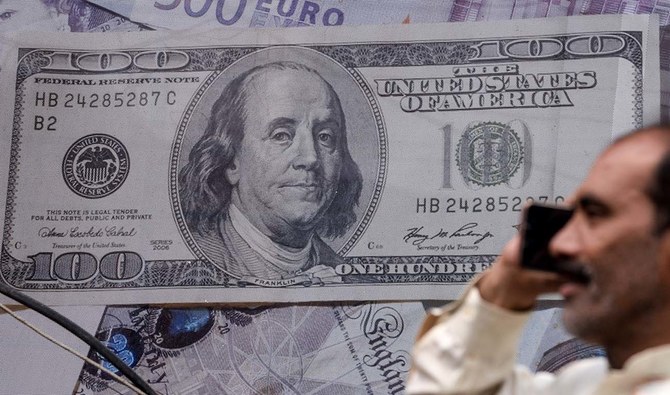
- The turnaround comes as dollar value of global debt surged by some $1.3 trillion quarter-on-quarter
- Pakistan is set to spend above 50 percent of its revenue on interest and Egypt more than 60 percent
NEW YORK: A key measure of world indebtedness has resumed its climb as global debt hit a record high of $315 trillion in the first quarter of the year, fueled by borrowing in emerging markets, the United States and Japan, a study showed.
The global debt-to-output ratio — a measure describing the ability of a borrower to pay back debt — rose to hit 333 percent after three consecutive quarters of decline, the Institute of International Finance (IIF) said on Tuesday in its quarterly Global Debt Monitor report.
The turnaround comes as the dollar value of global debt surged by some $1.3 trillion quarter-on-quarter.
Debt in emerging markets grew to a record of more than $105 trillion — having more than doubled over the past decade according to IIF data.
The largest contributors to the increase among emerging economies were China, India and Mexico. South Korea, Thailand, and Brazil posted the largest dollar value declines in overall debt among the subgroup, the data showed.
“Government budget deficits are still higher than pre- pandemic levels and are projected to contribute around $5.3 trillion to global debt accumulation this year,” the IIF said in a statement. “Rising trade friction and geopolitical tensions also present significant potential headwinds for debt markets.”
Interest rates were expected to have started declining in the United States by now but sticky inflation has seen the Federal Reserve stand its ground.
This has meant higher borrowing costs across the globe and, for many emerging markets, weakened currencies that further exacerbate the cost of servicing debt and “could once again bring government debt strains to the fore,” the IIF said.
Egypt and Pakistan are seen as the emerging economies where the interest expense on government debt will be highest through 2026, with Pakistan set to spend above 50 percent of revenue on interest and Egypt more than 60 percent.
Among developed economies, the United States and Japan saw debt rise the quickest, adding 17 percentage points and 4 percentage points respectively.
Japan is expected to continue to spend on average under 2 percent of government revenue in debt servicing through 2026, according to the IIF. In the US, the figure is expected to rise above 10 percent from the current 8 percent and brush against 12 percent in the same period.
Last month, the International Monetary Fund warned the US level of spending is “of particular concern” and “out of line with long-term fiscal sustainability.”
UK prime minister summons university leaders over pro-Palestinian protests
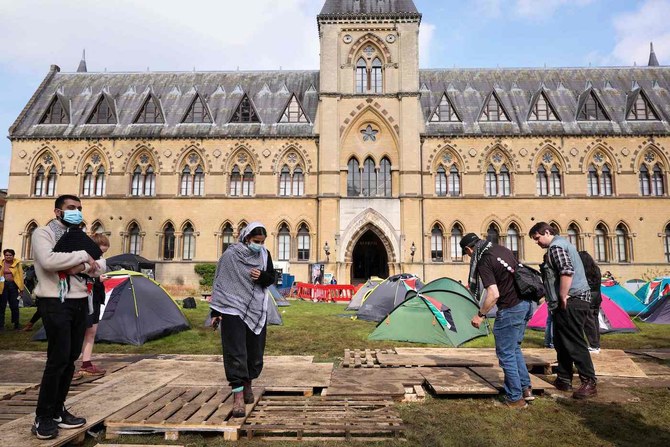
- Meeting to discuss antisemitism, ensuring Jewish students are safe
LONDON: UK Prime Minister Rishi Sunak is to summon the leaders of universities following pro-Palestinian protests that have taken place at campuses across the country.
The meeting will take place this week to discuss antisemitism on campuses and ensuring Jewish students are safe, Sunak told Britain’s Cabinet on Tuesday.
A spokesman for the prime minister said Sunak expected university leaders to take “robust action” in dealing with the protests, The Evening Standard reported.
“Our university campuses should be places of rigorous debate, but they should also be tolerant places where people of all communities, particularly Jewish students at this time, are treated with respect,” the spokesman said.
The “right to free speech does not include the right to harass people or incite violence,” he added.
The summons comes after British students set up pro-Palestinian protest encampments at Oxford and Cambridge campuses on Monday, in a show of solidarity with their American peers.
Cambridge University said its priority was the “safety of all staff and students” and that it was committed to freedom of speech.
“We will not tolerate antisemitism, Islamophobia and any other form of racial or religious hatred, or other unlawful activity,” a spokesperson said.
Pro-Palestinian protests have been taking place at US universities since April 17 and the protests have spread to Europe.
Police broke up student demonstrations in the Netherlands, Germany, and France on Tuesday as Israeli forces seized the main border crossing between Egypt and southern Gaza.



